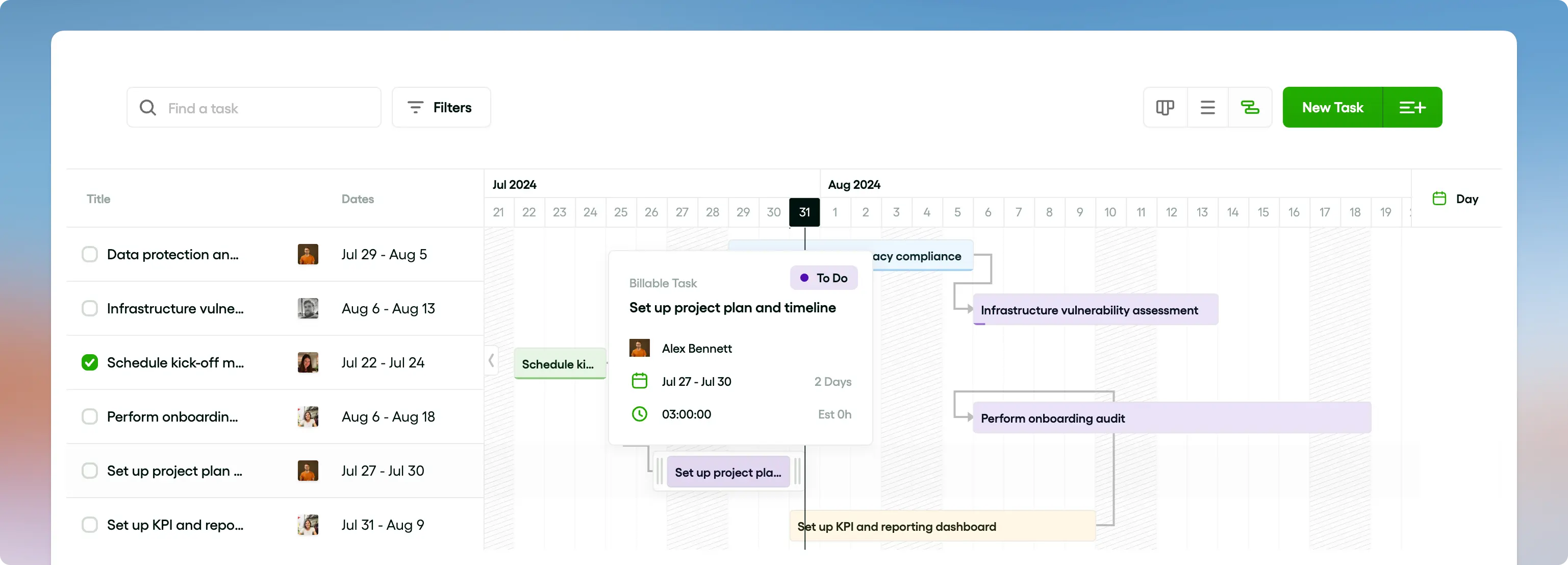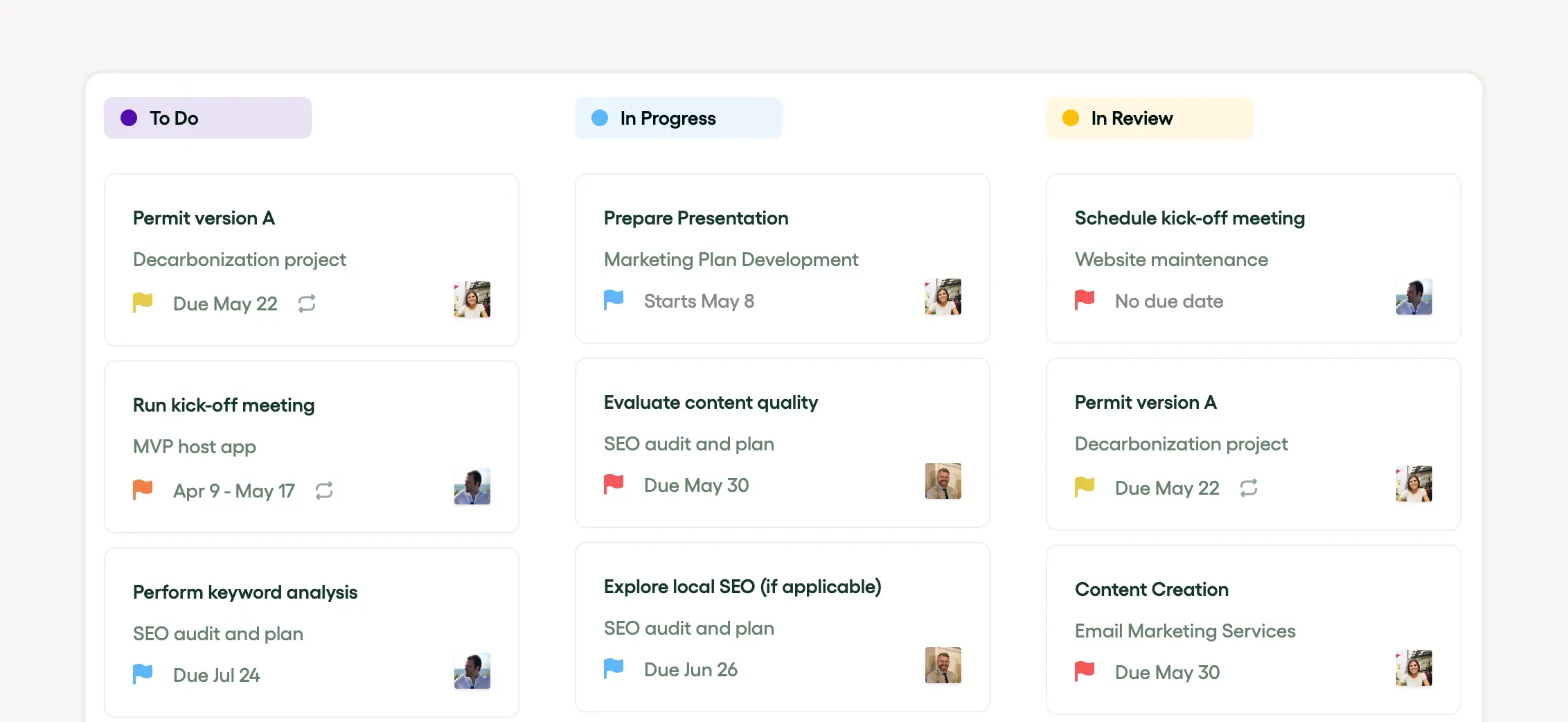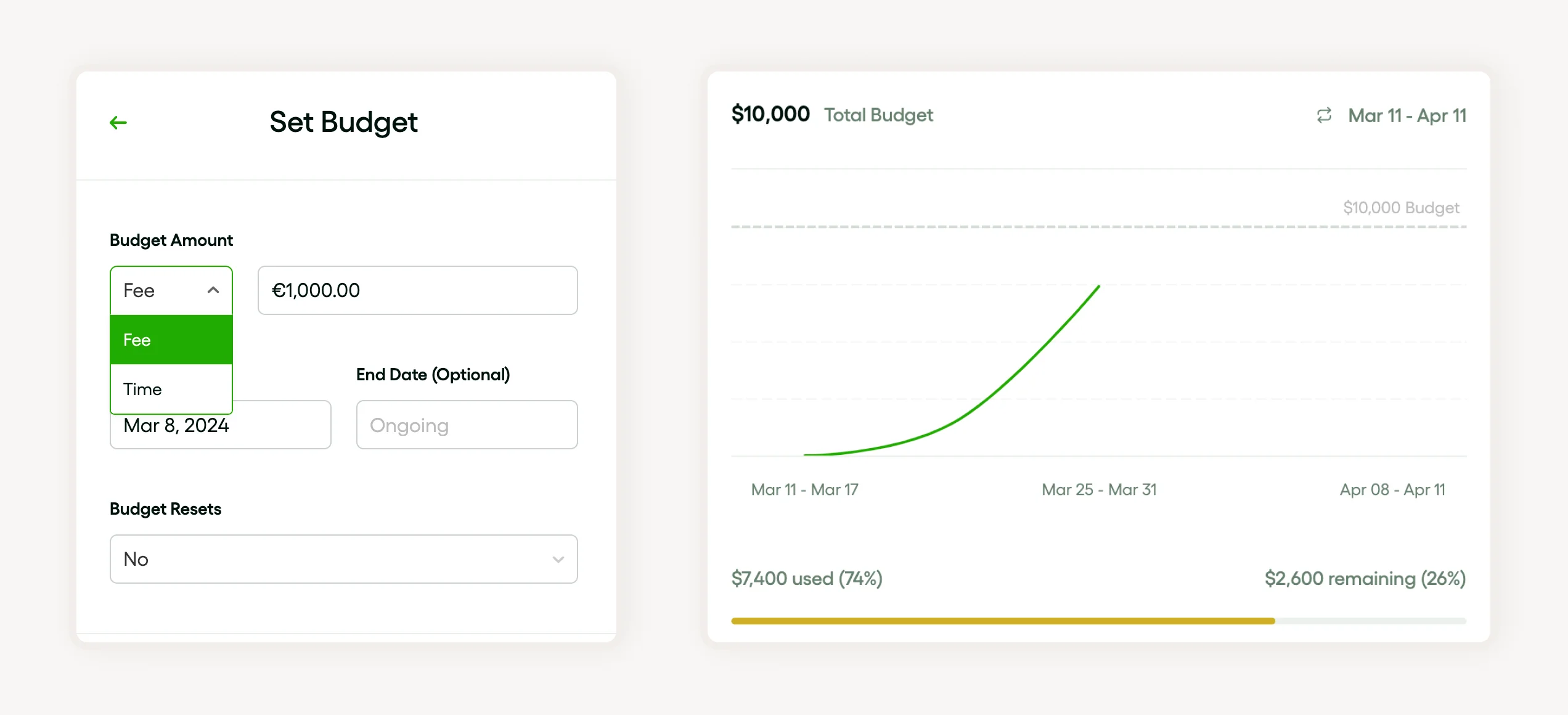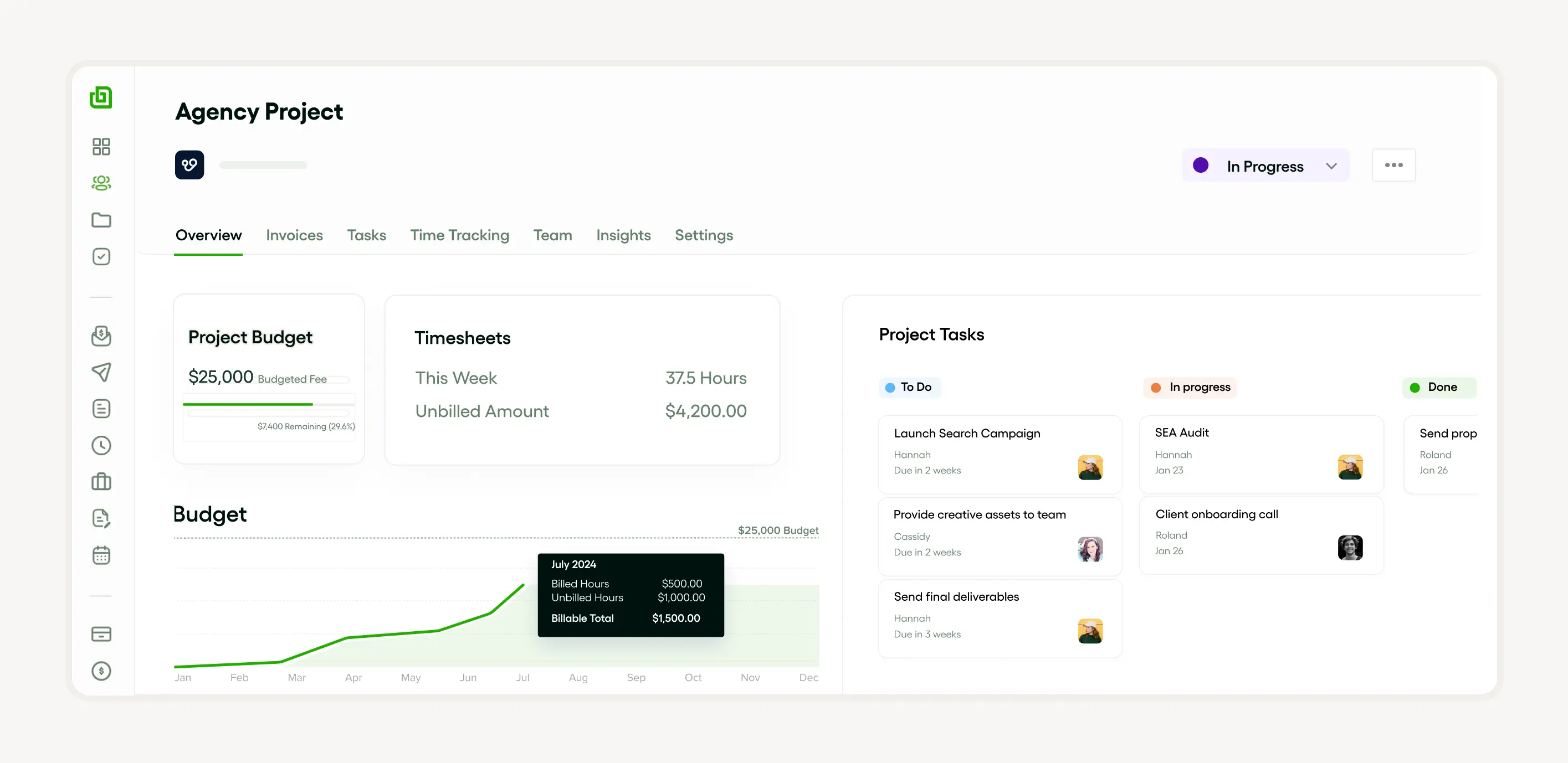In today's competitive business landscape, effective marketing project management is more critical than ever. However, behind every successful marketing campaign lies a well-executed marketing plan driven by solid project management. Marketing project management is the discipline that ensures all aspects of a marketing initiative are organized, on track, and aligned with the overall strategy. It involves coordinating tasks, managing resources, and overseeing timelines to deliver impactful results. In this article, we'll explore the fundamentals of marketing project management, including the steps to effectively manage marketing projects and the best project management tools.
What is marketing project management?
Marketing project management is the process of planning, executing and monitoring marketing projects, to make sure they are completed on time and within budget. It involves coordinating various tasks, resources and team members to create and deliver marketing campaigns, product launches and other marketing activities.
Why is project management important for marketing?
Project management is crucial for marketing teams because it ensures that campaigns are executed efficiently and effectively. It helps coordinate different tasks, manage resources, and keep projects on schedule and within budget. By organizing and overseeing all aspects of a marketing campaign, project management ensures that each element aligns with the overall strategy and objectives. This structured approach minimizes risks, reduces errors, and maximizes the impact of marketing efforts, leading to more successful and measurable outcomes.
What is the role of a marketing project manager?
A marketing project manager plays a pivotal role in project management. They are responsible for overseeing the project lifecycle, from inception to completion, ensuring project deliverables are met within the project scope and timeline. They also handle task management to ensure project milestones are achieved.
As part of the marketing team, they work closely with project stakeholders to develop and execute effective marketing campaigns. They set the project schedule, maintain the project budget, and spearhead efforts toward achieving project goals and objectives. The Marketing Project Manager plays a crucial role in fulfilling the business’s marketing needs.
Fostering a collaborative atmosphere, they lead the marketing team and enable them to perform efficiently. Their role is pivotal in aligning project objectives with the company's strategic vision.
4 steps to effective marketing project management
In order to succeed in marketing project management, one must not only have the necessary leadership skills but also a strategic approach to managing their team and resources. It is essential to create and follow a coherent planning process, ensuring that everyone involved has a clear understanding of their roles and responsibilities. This enhances collaboration and ultimately leads to the successful completion of the marketing project.
Effective marketing project management starts with defining a clear project scope, outlining project objectives and setting project goals. The project manager should collaboratively work with the marketing team to manage tasks, establish project milestones, and ensure alignment with the project timeline.
Regular check-ins and updates are essential to monitor the project lifecycle and progress towards deliverables. A transparent project schedule and a well-maintained project budget can help in keeping all project stakeholders on the same page.
1. Project planning
The process of marketing project management begins with planning the project. The key stakeholders will define the project goals, objectives and deliverables. This phase will include team members that will work on the project, and your client if you are a marketing agency.
Once everyone agrees on project goals, the project manager will define the project scope, devising the project in more granular tasks and a clear schedule. Let’s move on to the next phase.
2. Organizing project and tasks
With the goal, objectives and deliverables in mind, it’s time to define the tasks to be done. The project manager will create a marketing project plan, containing all tasks. Each task will be assigned to a team member, or to the project manager himself.
In Bonsai, tasks can be set with a priority level, start and due dates, estimated time and be assigned to team members. With your project board or list view, you’ll get a clear view of how tasks are progressing.

Task management is a critical part of this planning phase, involving the breakdown of the project deliverables into manageable tasks for the marketing team. Through frequent marketing campaigns, they keep all project stakeholders updated on project goals and progress.
In this phase, the project manager will also create the project schedule, defining when each task has to be completed and highlighting task dependencies. Using a Gantt chart will help you better visualize tasks dependencies.

3. Executing and monitoring the project
The project manager is responsible for executing and monitoring the project, using task management tools to track progress. The manager ensures that project deliverables align with the project scope, schedule, and budget, keeping every aspect within the project lifecycle in check. They work closely with the marketing team to align on project milestones and undertake effective marketing campaigns.
In Bonsai, you can get a glance at your project’s status using the Kanban board. Using this board view is ideal to check how tasks are progressing. You’ll be able to set custom columns and move the card from one column to another. It’s also a great tool to show the project’s progress to key stakeholders.

The project manager is also responsible for making sure the project stays on budget. Using a project management tool can be useful to track your project’s budget, and track time against it. By allocating an hourly rate to team members and making sure each team member tracks its time, the project manager will get an instant view of the budget. Thanks to Bonsai, he’ll also be able to set alerts, warning him when the budget hits a certain amount.

4. Closing and evaluating the project
The project manager, in coordination with project stakeholders, has successfully managed the project lifecycle adhering to the project timeline and budget. The marketing team has executed the planned marketing campaigns effectively thereby successfully achieving all the project deliverables. The attending milestones were met on time, underlying the efficiency of task management.
While wrapping up, the project objectives were evaluated and found to have met the project goals ensuring project success. The project scope was adequately maintained throughout and the Project Management was deemed successful in this aspect. The project now stands officially closed.
Once a project is closed, the project manager can assess if the project was a success, assessing team members performances, budget and profitability.

Best practices for marketing project management
To excel in marketing project management, it is imperative for the project manager to first delineate the project scope, objectives, and goals with precision. These elements must be in harmony with the overarching marketing campaigns and communicated effectively to all project stakeholders. Collaborating closely with the marketing team, the project manager is tasked with defining project deliverables and crafting a detailed project schedule and timeline, incorporating project milestones to gauge progress throughout the project lifecycle.
Task management
Robust task management is the cornerstone of ensuring that tasks are executed punctually and within the confines of the project budget. This encompasses vigilant monitoring, agile adjustments as necessary, and maintaining open channels of communication with all parties involved.
Setting clear goals and objectives
In the realm of project management, setting unambiguous project goals and objectives is a meticulous process. The project manager must engage in close collaboration with project stakeholders and the marketing team to ensure the project scope is congruent with the project deliverables. This process involves scrupulous task management to achieve project milestones and adhere to the project timeline and budget. These concerted efforts are vital for the triumphant execution of marketing campaigns.
Effective communication and collaboration
In the tapestry of project management, effective communication and collaboration are the threads that bind. The project manager’s pivotal role is to ensure the marketing team operates in unison, guaranteeing efficient task management and the fulfillment of project deliverables within the established timeline. Consistent updates regarding project milestones and the project lifecycle foster transparency and fortify trust among project stakeholders.
Regular monitoring and evaluation
Within the discipline of project management, regular monitoring and evaluation stand as pillars of a project’s success. These practices furnish the project manager and team with essential insights into the project’s advancement in relation to the timeline, budget, and milestones.

Monitoring entails a continuous appraisal of the project lifecycle to confirm that the project trajectory is on course.
Conversely, evaluation is the process of ascertaining whether the project deliverables are in alignment with the objectives and goals outlined in the project scope. For marketing teams executing campaigns and stakeholders overseeing task management, the significance of regular monitoring and evaluation is paramount.
Challenges in marketing project management and how to overcome them
One of the significant hurdles in marketing project management is establishing precise project scope. Without a well-defined scope, the project could suffer from scope creep, making task management a daunting task for the project manager.
Another challenge is maintaining an effective project timeline amid constantly changing marketing dynamics. Also, managing the project budget to meet project deliverables often pose difficulties.
To overcome these challenges, the marketing team should:
- Define project objectives and project milestones at the beginning of the project lifecycle.
- Incorporate flexibilities in the project schedule based on market changes.
- Involve all project stakeholders during budget planning to ensure the project goals meet the marketing campaigns' expectations and reality.
Managing multiple projects simultaneously
The art of managing multiple projects simultaneously lies in effective project management. The project manager plays a pivotal role in coordinating with the marketing team to align project deliverables and project milestones, within the project lifecycle. A clear project timeline, project scope, and project budget are critical instructions in the project schedule.
Proper task management contributes to the successful achievement of project goals and project objectives. In the context of marketing campaigns, a thorough understanding of project stakeholders is important to exactly tailor and time marketing efforts.
The complexity of handling several projects demands advanced organisational skills, strategic planning, and optimal resource allocation. All these aspects strengthen the ability to deliver high-quality results for each individual project within the overarching project timeline.
Dealing with changing market trends
Adept project management is essential when tackling ever-changing market trends. The project manager, along with their marketing team, must adaptively manage the project deliverables, milestones, and timeline to ensure project goals and objectives are met within the project scope and budget.
Key considerations include:
- Consistent task management to ensure flexible adaptation to changes.
- Regular communication with project stakeholders to keep them informed and active in decision-making.
- Continuous monitoring and adjustment of marketing campaigns in line with the market trends.
Ensuring team productivity and efficiency
Efficient project management is critical for ensuring team productivity and enhancing the performance of the marketing team. The project manager plays a pivotal role in defining project deliverables, outlining the project scope, and planning the project schedule. They also coordinate task management activities and monitor the project timeline to maximize efficiency.
The project manager is responsible for managing the project budget, signaling project milestones, and contemplating the entire project lifecycle. They align the project goals and project objectives with the expectations of project stakeholders. A keen eye for detail also ensures effective and timely execution of marketing campaigns.
Top 3 tools for managing marketing projects
Efficient project management tools are crucial for a marketing team to successfully deliver a project. Tools like Bonsai for task management, Trello for project timeline and milestones, and Slack for quick communication among project stakeholders are a must-have for any project manager. Moreover, implementing an efficient agency CRM tool can streamline the tracking and organization of customer relationships and interactions.
These tools ensure that project deliverables are met within the project scope and project schedule, aiding in seamless project lifecycle management. They also assist in effective project budget management, helping teams achieve their project goals and objectives, especially in marketing campaigns.
Bonsai
Bonsai is an intuitive platform to manage projects, clients and team in one place. It’s the perfect tools for marketing agencies seeking to deliver projects on time and budget.

Key features:
- Assign tasks to your teams and see how projects are progressing with the Kanban view
- Turn tasks into a project time with the Gantt chart
- Save time on repetitive tasks using task templates and recurring tasks
- Track your team’s hours and generate timesheets
- Control and track budget in real time across projects
- Follow project progress in real time and course-correct in time with instant reports
- Allocate your team’s time across projects and optimize utilization
Start a free trial or book a demo now.
Trello

Trello is a powerful project management tool invaluable for any project manager with its unique ability to categorize and prioritize project deliverables. It comes with an easy-to-use interface which makes task management, tracking project lifecycles, and defining project scope a streamlined process.
Specifically in a marketing team setting, Trello shines in managing marketing campaigns and meeting project objectives. Its ability to effectively set project milestones, arrange project schedules, and oversee project budgets tie in seamlessly with communication among project stakeholders, and ultimately in achieving project goals.
Slack

Slack is a powerful tool designed to enhance communication among teams. Integrating well across the project lifecycle, it provides excellent task management capabilities and eases the tracking of project deliverables for project managers. The marketing team can significantly benefit by coordinating their marketing campaigns and tracking project milestones within the application.
Furthermore, Slack aids in managing the project budget, schedule, and scope, making these details readily available for all project stakeholders. This ensures alignment with project goals and objectives, ultimately driving the successful completion of the project timeline.
How to choose the right marketing project management tool
Choosing the right marketing project management tool involves considering important functions like task management, project timeline, and project budget. These features aid the project manager and marketing team in tracking project deliverables and understanding the project lifecycle.
Key factors to consider include:
- Ability to clearly define project scope and project objectives.
- Capability to mark project milestones and manage project schedule
- Features to monitor project stakeholders' involvement and measure project goals.
Consider a tool that can integrate with your marketing campaigns for better coordination and results.
Understanding your business needs
Understanding your business needs is crucial in project management. You need to clearly define your project objectives and project scope, including project deliverables and project milestones. This will guide you in developing a realistic project timeline and project schedule, which is crucial for task management.
Focusing on the project lifecycle, you will be able to manage the project budget effectively and meet the expectations of project stakeholders. The project manager, along with the marketing team, plays a significant role in achieving project goals and steering marketing campaigns to success.
Evaluating features and pricing
When considering a project management tool, the project manager should evaluate several essential features. These include task management capabilities for the marketing team to keep track of project deliverables, a project timeline feature for maintaining the project schedule, and a project budget module to monitor spending.
Similarly, it's crucial to have pieces that assist in defining the project lifecycle, including project milestones, the project scope, and important project objectives. Moreover, a feature that manages project stakeholders can greatly enhance communication and ensure alignment with project goals.
Ultimately, pricing will also play a significant role in selecting a tool that can handle all these features effectively, as well as accommodating future marketing campaigns.
Considering user-friendliness and support
Utilizing robust project management tools significantly improves the user-friendliness for the marketing team. These tools provide an intuitive interface that simplifies task management, project scope specification, and project timeline tracking. It promotes the seamless tracking of project deliverables, milestones and project budget.
Equally, top-notch support services enhance the project lifecycle. Assistance from experienced support agents can boost project manager's efficiency by promptly addressing issues related to project objectives. The marketing team also benefits as more effective campaigns can be created by maximizing the features of these tools.
Essentially, user-friendliness and support increase the likelihood of achieving project goals and ensure the satisfaction of project stakeholders.
Conclusion: The impact of effective marketing project management
In conclusion, effective marketing project management profoundly influences a marketing team’s ability to meet project deliverables efficiently. An adept project manager, guided by adept task management, a clear-cut project timeline, and a well-defined project budget, can seamlessly navigate through the project lifecycle and satisfy the project scope. Consequently, they meet project milestones, appease project stakeholders, and ensure the success of marketing campaigns, learnedly driving the team towards accomplishing the project goals and objectives.





